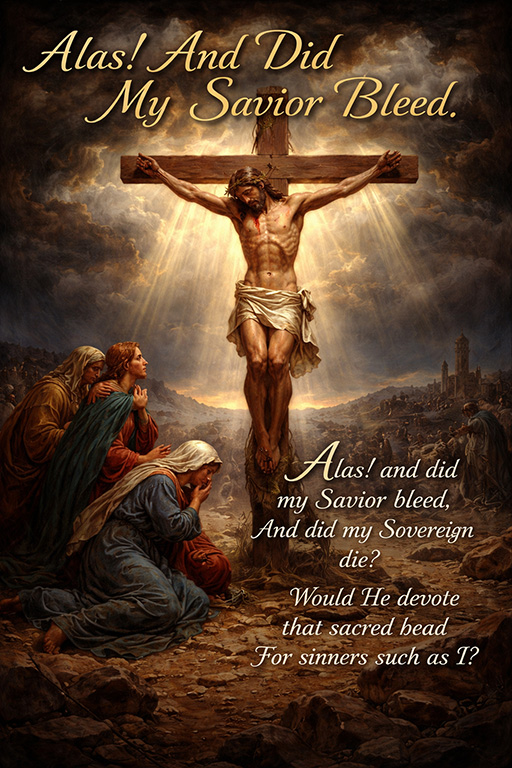Traditional Hymns
Alas! and Did My Savior Bleed
Alas! and Did My Savior Bleed
Listen to:
 Alas! and Did My Savior Bleed Piano (.mp3)
Alas! and Did My Savior Bleed Piano (.mp3)
 Alas! and Did My Savior Bleed (.midi)
Alas! and Did My Savior Bleed (.midi)
 Alas! and Did My Savior Bleed (.mp3)
Alas! and Did My Savior Bleed (.mp3)
 Alas! and Did My Savior Bleed Orchestral Version (.mp3)
Alas! and Did My Savior Bleed Orchestral Version (.mp3)
 Alas! and Did My Savior Bleed Bells Version (.mp3)
Alas! and Did My Savior Bleed Bells Version (.mp3)
1. Alas! and did my Savior bleed, and did my Sovereign die! Would he devote that sacred head for sinners such as I?
2. Was it for crimes that I have done, he groaned upon the tree? Amazing pity! Grace unknown! And love beyond degree!
3. Well might the sun in darkness hide, and shut its glories in, when God, the mighty maker, died for his own creature's sin.
4. Thus might I hide my blushing face while his dear cross appears; dissolve my heart in thankfulness, and melt mine eyes to tears.
5. But drops of tears can ne'er repay the debt of love I owe. Here, Lord, I give myself away; 'tis all that I can do.

Story of the hymn Alas! and Did My Savior Bleed
BackgroundIsaac Watts (1674–1748), the great English hymn writer, published this hymn in 1707 in his famous collection Hymns and Spiritual Songs.
The hymn is sometimes called “At the Cross” (especially in America), because later on it was paired with a refrain (“At the cross, at the cross…”) added by American composer Ralph E. Hudson in the 19th century.
Watts originally wrote it as a Good Friday meditation, reflecting on Christ’s crucifixion.
Inspiration & Theme
Watts wanted worshippers to feel the weight of the cross personally, not just see it as a distant historical event.
He based the hymn on Galatians 6:14 – “God forbid that I should glory, save in the cross of our Lord Jesus Christ.”
The opening line, “Alas! and did my Savior bleed, and did my Sovereign die?”, captures both shock and sorrow that Christ, the King of Glory, would die for sinners.
The Hymn’s Message
The first verses dwell on the wonder and unworthiness of Christ’s sacrifice: “Would He devote that sacred head for such a worm as I?” (modern hymnals often soften this line).
Later stanzas move from sorrow to personal response:
Grief for sin
Amazement at divine love
Devotion and thanksgiving for redemption.
The hymn ends with a call to give everything back to Christ in gratitude: “Here, Lord, I give myself away, ’tis all that I can do.”
